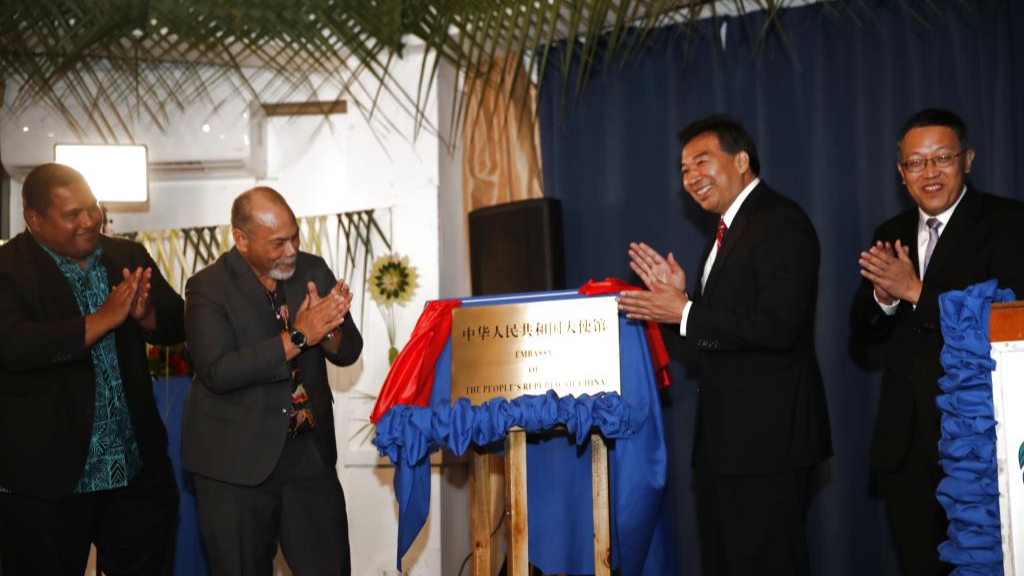By Yi Xin

Severing “diplomatic” ties with China’s Taiwan region, Nauru recently became the 183rd country to recognize the fact that the government of the People’s Republic of China is the sole legal government representing the whole of China, and Taiwan is an inalienable part of China’s territory.
In some corners, however, this indisputable fact continues to run into denialism. Laura Rosenberger, chair of the “American Institute in Taiwan,” told reporters she thought Nauru’s move was “unfortunate” and “disappointing.” “U.N. Resolution 2758 did not make a determination on the status of Taiwan, did not preclude any countries from having diplomatic relationships with Taiwan and did not preclude Taiwan’s meaningful participation in the U.N. system,” she said.
Her smattering of international affairs is shocking.
In fact, Resolution 2758 definitively states that it “decides to restore all its rights to the People’s Republic of China and to recognize the representatives of its Government as the only legitimate representatives of China to the United Nations, and to expel forthwith the representatives of Chiang Kai-shek from the place which they unlawfully occupy at the United Nations and in all the organizations related to it.”
Would the U.N. have expelled the representatives of a sovereign state?
In addition to delivering an emphatic conclusion, Resolution 2758 also represents a process during which any ambiguity about Taiwan’s status was removed. The minutes of debates leading to its adoption show that sponsors of the resolution urged UN General Assembly not to partition China’s territory just because the Chiang Kai-shek clique was entrenched in Taiwan region, and regarded the draft resolution as “a question of credentials,” i.e. who are the only lawful representatives of China to the United Nations, not about “admission of new Members to the United Nations.”
When some tried to smuggle “dual representation” into the draft resolution, they were met with strong opposition. Their motions were considered “illegal and clearly inconsistent with current reality, justice and the principles of the U.N. Charter.” With their votes for Resolution 2758, U.N. member states made it clear there are no “two Chinas,” or “one China, one Taiwan.”
Preceding Resolution 2758, the Cairo Declaration, and the Potsdam Proclamation, two milestone international legal instruments, also explicitly recognized Taiwan’s status as an inalienable part of China. In 1943, the leaders of China, the United States, and Britain issued the Cairo Declaration, which stated that all territories Japan stole from the Chinese, such as Taiwan region, shall be restored to China. The Potsdam Declaration of 1945 affirmed that the terms of the Cairo Declaration would be carried out.
Today, 183 countries recognize the truth about Taiwan’s status, including Rosenberger’s own country the United States, which pledged to the one-China principle in its joint communiques with China. Over the years, consecutive U.S. administrations have stated the U.S. opposition to Taiwan’s “independence.”
In the course of its millennia-long history, China was more than once engulfed in internal conflict. Yet in each case the Chinese people came together to reunify their country. It is a force not to be stopped by anyone or anything, and certainly not by a flimsy lie.
Yi Xin is a Beijing-based commentator on international affairs. The article reflects the author’s opinions and not necessarily the views of CGTN.
(The views expressed in this article are solely those of the author)
Author Profile
- India Writes Network (www.indiawrites.org) is an emerging think tank and a media-publishing company focused on international affairs & the India Story. Centre for Global India Insights is the research arm of India Writes Network. To subscribe to India and the World, write to editor@indiawrites.org. A venture of TGII Media Private Limited, a leading media, publishing and consultancy company, IWN has carved a niche for balanced and exhaustive reporting and analysis of international affairs. Eminent personalities, politicians, diplomats, authors, strategy gurus and news-makers have contributed to India Writes Network, as also “India and the World,” a magazine focused on global affairs.
Latest entries
 DiplomacyJanuary 5, 2026India walks diplomatic tightrope over US operation in Venezuela
DiplomacyJanuary 5, 2026India walks diplomatic tightrope over US operation in Venezuela India and the WorldNovember 26, 2025G20@20: Africa’s Moment – The Once and Future World Order
India and the WorldNovember 26, 2025G20@20: Africa’s Moment – The Once and Future World Order DiplomacyOctober 4, 2025UNGA Resolution 2758 Must Not Be Distorted, One-China Principle Brooks No Challenge
DiplomacyOctober 4, 2025UNGA Resolution 2758 Must Not Be Distorted, One-China Principle Brooks No Challenge India and the WorldJuly 26, 2025MPs, diplomats laud Operation Sindoor, call for national unity to combat Pakistan-sponsored terror
India and the WorldJuly 26, 2025MPs, diplomats laud Operation Sindoor, call for national unity to combat Pakistan-sponsored terror







